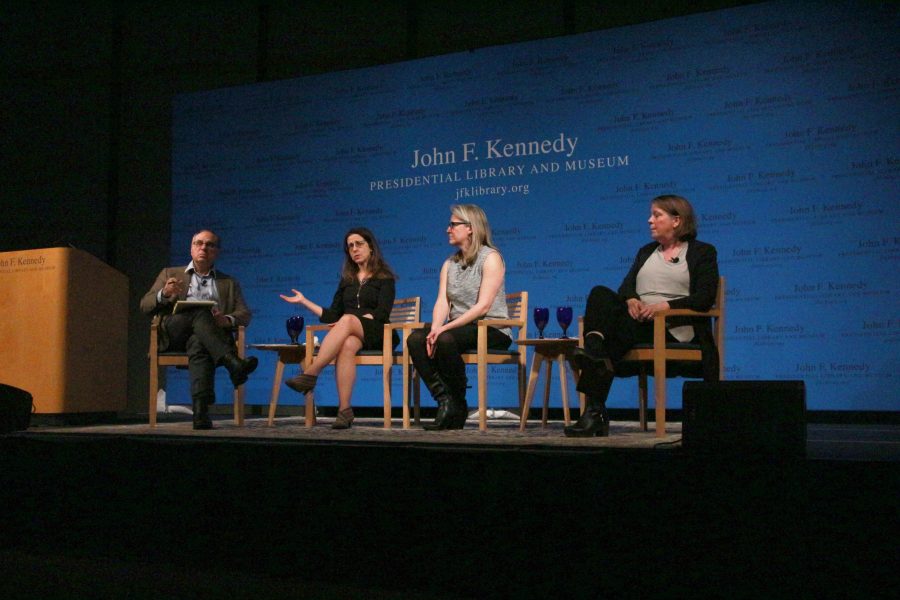On March 27, the John F. Kennedy Library and Museum hosted a forum panel, “The First Amendment: What Are Its Limits?”
The event featured three speakers. First introduced was Susan Benesch, founder and director of the Dangerous Speech Project. The organization studies “dangerous speech and ways to counteract it.” The next speaker was the recently appointed managing editor at The Boston Globe, Jennifer Peter. Finally, the third panelist, Carol Rose, is the executive director of the American Civil Liberties Union (ACLU) of Massachusetts. The ACLU is a private, nonpartisan organization that works with the government and communities to protect human rights as promised in state and federal laws.
Local news radio journalist and senior correspondent Bruce Gellerman of WBUR acted as the panel’s moderator. During his time as a journalist, he has received more than 50 national awards, mainly for his work covering science, business, technology, and environmental news.
After the introduction of the speakers, Gellerman led straight into the discussion of what the First Amendment is and what it means in this day and age by asking: “Do we need to redefine, to reword, the First Amendment?”
The First Amendment of the United States Constitution states: “Congress shall make no law respecting an establishment of religion, or prohibiting the free exercise thereof; or abridging the freedom of speech, or of the press; or the right of the people peaceably to assemble, and to petition the Government for a redress of grievances.”
Benesch answered, “The amendments were shifted around even as they were being passed. What we often forget is that they have been [very, very] differently interpreted over the course of their lives and of the life of our republic, so like the Second Amendment, the First Amendment was interpreted [very] differently for most of our history. In other words, it was not understood to prevent the suppression of speech that the government didn’t like, including, for example, speech encouraging people to resist the draft or communist speech. We have prosecuted and imprisoned people in some of our most famous First Amendment cases.”
In President John F. Kennedy’s Address before the American Newspaper Publishers Association on April 27, 1961, he said, “…that is why our press was protected by the First Amendment—the only business in America specifically protected by the Constitution—not primarily to amuse and entertain, not to emphasize the trivial and the sentimental, not to simply ‘give the public what it wants’—but to inform, to arouse, to reflect, to state our dangers and our opportunities, to indicate our crises and our choices, to lead, mold, educate and sometimes even anger public opinion.”
The forum went on to talk about what that interpretation of the amendment means for journalists and reporters today. Truth has become a blurred line, Peter said, “the truth is taking a beating, right? And, and truth is no longer empirical, it’s opinion.” Peter believes journalists are “doing incredible work” but “it doesn’t have the same impact right now, in the moment, [she, Peter is] hoping cumulatively, historically, the truth will prevail…”
Another topic discussed was hate speech and its legality. The Dangerous Speech Project, led by Benesch, has coined the term “dangerous speech.” The organization defines this term as “any form of expression (speech, text, or images) that can increase the risk that its audience will condone or participate in violence against members of another group.”
Benesch delved into that and stated, “Our law, as Carol said, distinguishes, although that’s not always easy, between speech and action. So hate crime is one thing in American law, it’s, of course as its name suggests, a crime. Hate speech as such is not. However, this very narrow category of hate speech in which you are also trying to incite people to violence [and] you’re likely to have some success with that pretty soon? That you can hear all the caveats, right, all the specific qualifications that narrow the category, so that [is] crime.”
The event ended with a Q&A. Seven audience members came up, as well as a call-in from Texas, who wanted to exercise their freedom of speech. One of the audience members, an older woman, asked if there was any chance for more women in Washington, as well as a hope for a female president in the future.
Another member, an older man contributed to the discussion by saying, “There are three R’s that I suggest we need to bring back to the country. One of them is ‘respect.’ That’s respect for the other person’s rights. The other one is ‘responsibility.’ Take responsibility for what you do and say. And the third one is ‘recidivism.’ That means if you’re going to give somebody the right to speak, then step back and listen and let them speak too. Maybe we’d learn something!”





















































